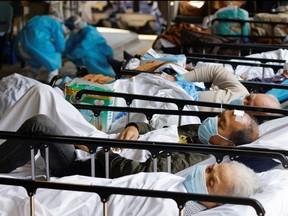Article author:

Reviews and recommendations are fair and The product was selected independently. Postmedia may earn affiliate commissions from purchases from links on this page.
The following is a summary of some recent studies on COVID-19. They require further research to support the findings and include research that has not yet been certified by peer reviews.
Some long COVID patients still have the virus in their blood
Some cases of long COVID are lurking somewhere SARS -A new discovery from a small study suggests that the body may be a reaction of the immune system to CoV-2 infection.
Researchers analyzed multiple plasma samples collected over time from 63 COVID-19 patients, including 37 who continued to develop long COVIDs. In the majority of people with long COVIDs, spike proteins from the surface of the virus were detectable for up to 12 months, but were not present in the plasma samples of patients who recovered without persistent symptoms. Spike proteins that circulate in the blood may mean that "reservoir of active virus remains in the body," researchers said in a peer review published last week inmedRxiv. Said prior to. The exact location of the reservoir is not clear from this study. Researchers said they had previously discovered an active virus in the gastrointestinal tract of children weeks after the initial infection with coronavirus, and other researchers said that "multiple anatomicals up to 7 months after the onset of symptoms" "At the site," he said he found genetic evidence of the virus.
If the results can be confirmed in a larger study, the presence of spiked protein in the blood long after the initial infection may be one way to diagnose long COVID. The researchers said it was sexual.
Paxrovid "rebound" patients may require longer treatment
Reported in some COVID-19 patients who took Pfizer's antiviral Paxrovid pill for 5 days Rebound of symptoms has been treated, according to researchers who have scrutinized one such patient, which may be an inadequate result.
study results show that Paxlovid can reduce the risk of COVID-19 hospitalization and death in high-risk patients by 89% if taken within 5 days of onset of symptoms. However, in some patients, after completing the Paxrovid course, viral levels and symptoms may have improved and variants may have developed resistance to dual-drug treatment, or pills may be patient antibody resistance. Has led to concerns that it may be weakening in some way. However, when researchers isolated the Omicron BA.2 variant from rebounded patients and tested it in lab experiments, they found that it was still sensitive to Paxlovid and that there were no mutations that reduced the efficacy of the drug. They also found that the patient's antibodies could prevent the virus from invading and infecting new cells.
Paxlovid Post-treatment COVID-19 symptom rebound reaches infected cells with enough drug to completely prevent the virus from making its own copy. Researchers said it was more likely to occur because they did not. A paper published Monday inClinical Infectious DiseasesAlso, the drug may be metabolized or processed at different rates in different people, or some people need to take it for at least 5 days. There is a possibility.
After COVID-19, the child will show more symptoms, but less anxiety
Persistent health problems, a child of similar age who avoided the virus It was slightly more common in children after COVID-19 than. According to a report from Denmark, it was reported on Wednesday atLancet Child&Adolescent Health, but the level of anxiety was higher in children who had never experienced COVID-19. Researchers found it to be expensive.
They said that 40% of infants and toddlers with COVID-19, and 27% of their uninfected companions, experienced at least one symptom for more than 2 months. I did. Among children aged 4 to 11 years, persistent symptoms were seen in 38% with COVID-19 and 34% without COVID-19. In addition, 46% of people between the ages of 12 and 14 and 41% who did not use COVID-19 had long-term symptoms. The results are based on a survey of nearly 11,000 mothers of infected children and nearly 33,000 mothers of uninfected children.
Long COVID-related symptoms such as headache, upset, abdominal pain, and fatigue are often experienced by otherwise healthy children, but infected children show longer lasting symptoms. One-third showed new symptoms that developed after COVID-19. To the surprise of the researchers, the children with COVID-19 experienced less psychological and social problems than the children in the control group. They speculated that this may be due to the increased "fear of unknown illnesses and restrictions on daily life" in uninfected children to protect themselves from catching the virus.

From the newsroom to the noon inbox, Toronto Sun's latest headlines, stories, opinions and photos. By clicking the
Thank you for registering.
A welcome email will be sent. If you don't see it, check your junk folder. The next issue of
Your Midday Sun will arrive in your inbox shortly.


